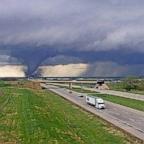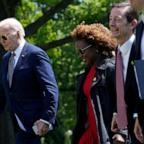What you need to know about the Kurdish referendum
Many Kurds see this as their chance to get legitimacy.
— -- In a bold step toward an uncertain future, the Kurdish people living in northern Iraq are heading to the polls today to cast their ballots in a referendum for independence.
Ironically, the vote has led to a rare moment of unity in the Middle East as every one of Kurdistan’s neighbors, plus some of the world’s leading nations including the United States and the United Kingdom, have condemned the referendum and urged Kurdish leaders in Erbil, Iraq, to call it off. Even bitter rivals Saudi Arabia and Iran are in agreement over this one.
What is it?
It’s a regionwide referendum in the northern Iraqi Kurdistan region to gauge national support for an independence movement from Iraq. The vote is nonbinding, meaning that even if the result is overwhelmingly in favor of splitting from Baghdad, there will be no legal requirement for Kurdish leaders to declare formal independence. However, independence movements have a way of building momentum, and many Kurds see this as their chance to finally get legitimacy. Many Kurds feel they were snubbed initially by British and French mapmakers who left them on the sidelines while drawing up national boundaries of the Middle East in the aftermath of World War I, and then let down again by the United States after they supported the overthrow of Saddam Hussein in 2003 but never got the nation-state they hoped for.
Why now?
Relations between the Kurds in northern Iraq and the rest of the nation have never been good, and there is a lot of pent-up hostility and resentment. Despite the recent facade of unity between Kurdish Peshmerga forces and the Iraqi National Army in the battle against ISIS, sectarianism has spiked in Baghdad and Erbil recently, with grievances that had been shielded in recent months now on naked display. For Iraq’s Kurds, the memories are still fresh of Saddam Hussein gassing their countrymen at Halabja in 1988, killing as many as 5,000 people. They also point to Saddam’s attempts at ethnic cleansing after the First Gulf War, which were only averted when the U.S. instituted a no-fly zone over Kurdistan. Then there are financial disagreements. Ever since the price of oil bottomed out, Baghdad has slashed salaries of public servants in Kurdistan by up to 70 percent. With little financial benefit from Baghdad, many in Erbil are now wondering if striking out on their own could be any worse. Militarily, the Iraqi army took a real beating in the fight against ISIS while Kurdish Peshmerga troops for the most part watched from the sidelines. Ranks are depleted and morale stretched. Iraq’s army has not been this weak in a long time.
Why so much opposition?
The United States and the United Kingdom along with France, the Arab League, and the United Nations have warned that the ballot could have a destabilizing effect on an already volatile region. They say it could lead to a bloody breakup of Iraq and bring more harm than good. Iraqi Prime Minister Haider al-Abadi is poised to take Iraq to an election next year. Being seen as a national leader who lost one third of the country is not something that he, or his backers, find palatable. Turkey to the north and Iran to the east both have significant ethnic Kurdish populations, and the thought of an emboldened, rising Kurdish freedom movement on their doorsteps fills them with dread. The last thing they want is independence fever spreading across their borders. One of the flashpoints is likely to be around the city of Kirkuk. In that oil-rich city claimed by Kurdistan but inhabited by many Iraqis of Arab descent, skirmishes between militias and armed gangs could be the spark that involves wider regional conflict.
What's next?
No one knows for sure what will happen after the referendum, but it’s certain that relations between Erbil and Baghdad will change forever. Opinion polls in Kurdistan are heavily tipped in favor of independence and, although voting stations only opened a short while ago, it’s expected to be a landslide for separation. Because the referendum is technically a gauge of public opinion and has no legal mandate, there will be no trigger for obliging Erbil to declare independence. But many are worried that a vote in favor of freedom will unleash unstoppable momentum, inflaming passions and leading to revolt and bloodshed. Tehran is clearly worried. Iran’s powerful Revolutionary Guard launched a military exercise on Sunday in its northwestern Kurdish region. Iran also closed its airspace on Sunday to flights taking off from Iraq’s Kurdish region following a request from Baghdad as punishment for the referendum. Turkey is holding military drills near its own border with Iraq too, yet Turkey engages in massive amounts of trade with Kurdistan and would be loathe to upset that financial relationship.
Polls close at 6 p.m. local time and the final result of the referendum is expected within 72 hours.




